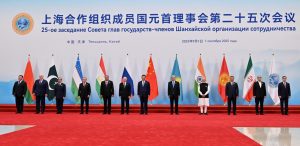In what has been described as a “stress test,” the Shanghai Cooperation Organization’s recent summit sheds light on the role of quiet diplomacy in a multipolar world. From August 31-September 1, more than 20 foreign leaders and heads of 10 international organizations gathered in the Chinese port city of Tianjin.
Founded in 2001, the SCO emerged from a grouping of China, Kazakhstan, Kyrgyzstan, Russia, and Tajikistan known as the “Shanghai Five” established to delineate and stabilize the post-Soviet borders of Central Asia. The organization seeks to enhance mutual trust, promote good neighborliness, and fight what it calls the “three evils” of terrorism, separatism, and extremism.
The SCO has since doubled its membership and now includes Belarus, China, India, Iran, Kazakhstan, Kyrgyzstan, Pakistan, Russia, Tajikistan, and Uzbekistan. Counting full members and partner states, the SCO represents 40 percent of the world’s population and 30 percent of its GDP.
With decision-making requiring consensus between member states, the organization has often been dismissed as a Eurasian “talk shop” ineffective in carrying out its mission. In June, India refused to sign an SCO joint statement because it did not reference the Pahalgam attack that killed 26 tourists in Indian-administered Kashmir earlier this year, which India blamed on Pakistan. The attack sparked a four-day conflict of missile exchanges and border skirmishes between India and Pakistan, both SCO members.
But Indian Prime Minister Narendra Modi was all smiles beside Russian President Vladimir Putin and Chinese leader Xi Jinping during the recent meeting. The summit’s “Tianjin Declaration” stated that the SCO “strongly condemns the terrorist attacks in Pahalgam.”
The declaration was also signed by Pakistani Prime Minister Shehbaz Sharif.
The SCO’s opaque nature makes it essentially impossible to know how this compromise came about, but it is clear that Beijing, New Delhi, and Islamabad demonstrated interest in maintaining SCO unity despite the tensions that preceded the summit. U.S. President Donald Trump’s 50 percent tariff on India that went into effect in late August included a 25 percent penalty for the country’s transactions with Moscow. This year, more than a third of India’s oil imports originated from Russia.
Vladimir Norov, a former SCO secretary general, shared his reflections of the summit on social media: “With the U.S. under President Trump still pursuing protectionist trade policies, many states are seeking alternatives. The SCO offers an economic and diplomatic umbrella to reduce exposure to Western economic pressure.”
The Tianjin summit stands in stark contrast with Trump’s attempts to take the lead, whether in meetings with his Ukrainian or Russian counterparts. Instead, Beijing has perfected the ability to gather a significant number of states, three of which are nuclear powers, around itself.
On the sidelines of the SCO summit, leaders also took the opportunity to meet bilaterally. Modi met with Putin and expressed his hope to “end the conflict [in Ukraine] soonest and establish peace permanently, we need to find a way. It’s a call for the entire humanity.”
In broadening the SCO’s roles, Xi announced plans to establish a SCO Development Bank and pledged $1.4 billion in loans over the next three years for the organization. The Tianjin Declaration also gave a nod to the construction of the China-Kyrgyzstan-Uzbekistan railway, part of the “Middle Corridor” linking China to Europe through Central Asia and the South Caucasus.
Additionally, Laos joined as an SCO partner following the organization’s merging of “dialogue partner” and “observer” into the role of “partner.” Laos joins Myanmar as the only Southeast Asian states associated with the organization.
It is no surprise that amidst Trump’s tariff policies, coupled with the rise of great power competition, SCO member states and partners have gathered in Tianjin as a call to safety during such turbulent times.
“By convening such a diverse group – from Iran to Indonesia, from Turkey to Egypt,” Norov argued, “China is presenting itself not only as a regional leader but as a central node in global governance.”
Neither the United States, the European Union, or any of its members engaged with the SCO directly. The West may be missing out on the opportunity to play a part in shaping the norms of the Eurasian continent. As a broad regional organization, the SCO is not a monolith. Certain member states such as Kazakhstan and India might, in fact, welcome Western involvement. But as long as the SCO is viewed strictly as a Eurasian “club for dictators,” then the West will only enable the region to become a black box.
































